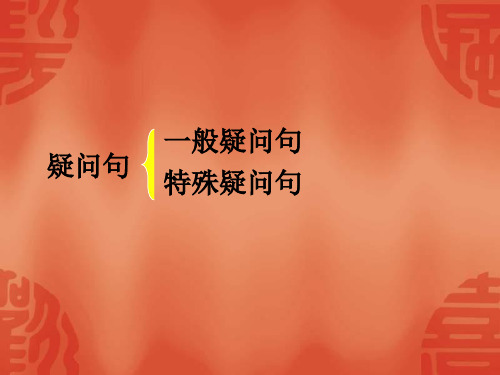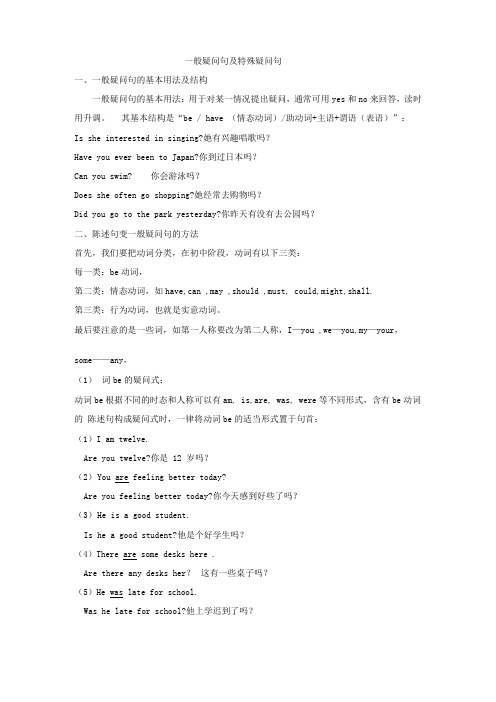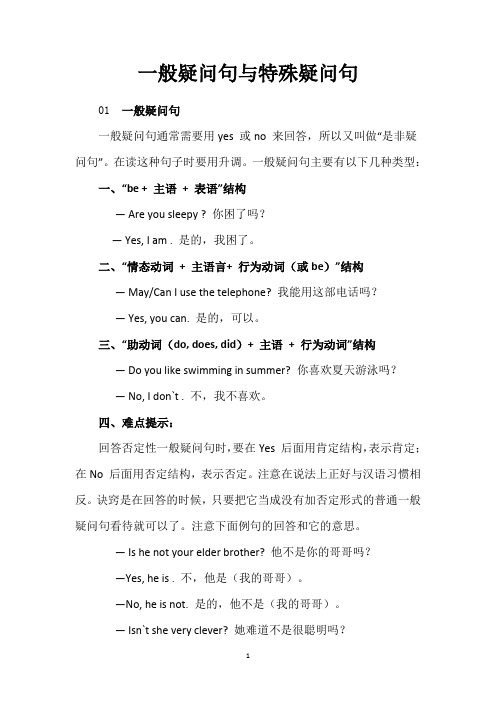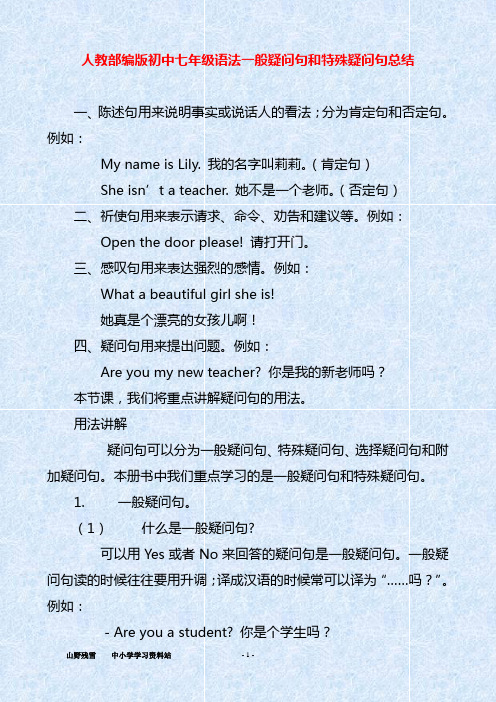七年级一般疑问句和特殊疑问句
一般疑问句和特殊疑问句知识点总结

疑问句最常见的疑问句有两类:1.一般疑问句:可以用Yes和No回答的问句2.特殊疑问句:以特殊疑问词7w1h(比如what/how等等)开头的疑问句一般疑问句(句型结构会根据时态发生相应的细微变化,但总体框架不变)①be动词+主语+其他?(注意be动词和主语的匹配)例句:Are you a policeman? 你是个警察吗?-Yes, I am. 是的,我是。
-No, I am not. 不,我不是。
②情态动词+主语+动词原形+其他?(注意情态动词后面跟动词原形)例句:Can you swim? 你会游泳吗?-Yes, I can. 是的,我会。
-No, I can’t. 不,我不会。
③助动词+主语+动词原形+其他?(注意助动词和主语的匹配)例句:Do you like dancing? 你喜欢跳舞吗?-Yes, I do. 是的,我喜欢。
-No, I don’t. 不,我不喜欢。
Do you go to school every day? 你每天去学校吗?做句型转换的方法(如何将陈述句变成一般疑问句):先看句子中是否有be动词或者情态动词A.如果有be动词或者情态动词,对照一般疑问句句型①/②将be动词或者情态动词提到句首,其他部分依次照抄B.如果没有be动词或者情态动词,对照一般疑问句句型③句首+助动词(注意是否要和主语匹配变化),其他部分依次照抄,注意原来的动词要变为原形#无论是哪一种情况,都要注意第一人称要变成第二人称,第二人称要变成第一人称(you和I的切换)特殊疑问句(句型结构会根据时态发生相应的细微变化,但总体框架不变)①特殊疑问词(作主语)+谓语+其他?(陈述句语序)例句:Who is reading a book? 谁正在读书?Which is the biggest? 哪个是最大的?Who likes dancing? 谁喜欢跳舞?②特殊疑问词(作主语修饰语)+主语+谓语+其他?(陈述句语序)例句:Whose bag is red? 谁的包是红色的?How many people work in the school?有多少人在学校工作?③特殊疑问词+一般疑问句(详见上面的一般疑问句结构)?(此情况为当特殊疑问词代替的部分不是主语或者主语修饰语时)例句:What are you doing? 你在做什么?What colour do you like? 你喜欢什么颜色?做句型转换的方法(如何将句子转变成特殊疑问句):先看划线部分是否为句子中的主语或者主语修饰语A.如果是主语,对照特殊疑问句句型①划线部分用特殊疑问词代替,其他部分照抄(该疑问句为陈述句语序)B.如果是主语修饰语,对照特殊疑问句句型②划线部分用特殊疑问词代替,其他部分照抄(该疑问句为陈述句语序)C.如果不是主语或者主语修饰语,对照特殊疑问句句型③先将原来的陈述句变成一般疑问句(如果本来就是一般疑问句就不需要再做修改)划线部分用特殊疑问词代替再将特殊疑问词提前到句首#如果划线部分是动词或者动词短语,表示做什么事,那变为特殊疑问词的时候要用do what 代替特殊疑问词主要分为两类:wh- (wh开头的疑问词)和how - (how开头的疑问词)How often:多长时间一次,问频率。
初中英语一般疑问句和特殊疑问句

初中英语一般疑问句和特殊疑问句在英语学习中,一般疑问句和特殊疑问句是非常基础且重要的语法点,它们用于不同的交流情境中。
下面我会分别解释这两种句型的构成和使用方法,并提供一些例句。
一般疑问句一般疑问句用于询问事实或情况是否属实,通常期望对方用"Yes"或"No"来回答。
其构成是在陈述句的句首加上助动词、be动词或情态动词,并将句中的动词变回原形(如果有助动词或be动词,则保留原形)。
构成规则:1.如果句子中有be动词(am/is/are/was/were),则将be动词移到句首。
2.如果句子中有情态动词(can/could/may/might/will/would等),则将情态动词移到句首。
3.如果句子中没有上述两种动词,则根据时态选择相应的助动词do/does/did 放在句首。
例句:-陈述句:She is a student.-一般疑问句:Is she a student? (Yes, she is. / No, she isn't.)-陈述句:They can swim well.-一般疑问句:Can they swim well? (Yes, they can. / No, they can't.)-陈述句:You like coffee.-一般疑问句:Do you like coffee? (Yes, I do. / No, I don't.)特殊疑问句特殊疑问句用于询问具体的、特定的信息,句首使用特殊疑问词(what, who, where, when, why, how等)。
特殊疑问句的构成是特殊疑问词+一般疑问句的语序。
构成规则:1.特殊疑问词放在句首。
2.根据需要选择适当的助动词、be动词或情态动词,并调整语序,使其符合疑问句的结构。
例句:-Who is your favorite singer?-Where do you live?-When did you start learning English?-Why are you late today?-How do you usually go to school?通过掌握这些基本规则和例句,你可以更有效地在日常对话中使用一般疑问句和特殊疑问句。
七年级一般疑问句和特殊疑问句

2.将下列句子变成单数。
1.They are pencils. It
is a pencil.
2.These are erasers. This is an eraser.
3.They are boys. He is a boy.
4. They are girls . She is a girl.
5.Those are books. That is a book.
Your mouth is wide.
五.单复数转换
1.将下列句子变成复数. It is a box . They are boxes .
This is a ruler. These are rulers. That is an eraser. Those are erasers. He is a student. They are students. This is a bus. These are buses . That is a pen. Those are pens .
肯:Yes, she does.否:No, she doesn’t.
3.问句和答语中的主语保持一致。(必须用主格)
1) Is Jane from the U.S.A?
肯:Yes, she is. 否:No, she isn’t.
2) Does Kangkang come from China?
肯:Yes, he does. 否:No, he doesn’t.
3) Do Jane and Maria like China?
肯:Yes, they do. 否:No, they don’t.
4) Is this a ruler?
肯:Yes, it is . 否:No,it isn’t.
初一一般疑问句及特殊疑问句

一般疑问句及特殊疑问句一、一般疑问句的基本用法及结构一般疑问句的基本用法:用于对某一情况提出疑问,通常可用yes和no来回答,读时用升调。
其基本结构是“be / have (情态动词)/助动词+主语+谓语(表语)”:Is she interested in singing?她有兴趣唱歌吗?Have you ever been to Japan?你到过日本吗?Can you swim? 你会游泳吗?Does she often go shopping?她经常去购物吗?Did you go to the park yesterday?你昨天有没有去公园吗?二、陈述句变一般疑问句的方法首先,我们要把动词分类,在初中阶段,动词有以下三类:每一类:be动词,第二类:情态动词,如have,can ,may ,should ,must, could,might,shall.第三类:行为动词,也就是实意动词。
最后要注意的是一些词,如第一人称要改为第二人称,I—you ,we—you,my—your,some——any,(1)词be的疑问式:动词be根据不同的时态和人称可以有am, is,are, was, were等不同形式,含有be动词的陈述句构成疑问式时,一律将动词be的适当形式置于句首:(1)I am twelve.Are you twelve?你是 12 岁吗?(2)Y ou are feeling better today?Are you feeling better today?你今天感到好些了吗?(3)H e is a good student.Is he a good student?他是个好学生吗?(4)There are some desks here .Are there any desks her?这有一些桌子吗?(5)He was late for school.Was he late for school?他上学迟到了吗?2.情态动词:如 can ,may ,should ,must, could,might,shall. (1)You can speak English.Can you speak English?你会说英语吗?(2)I must finish the work at once.Must I finish the work at once?我必须马上完成工作吗?(3)He should stay at home?Should he stay at home? 他必须呆在家吗?(5)She may be at home.May she be at home? 她可能在家吗?(6)He used to get up late.Used he to get up late?他通常起床很迟吗?3.实意动词的疑问式:含有一般实意动词的陈述句,通常应根据不同时态和人称在句首加助动词do, does, did等.一般现在时用do ,does,(第一人称,第二人称,所有的复数人称用do,第三人称单数用does), 一般过去时用did.(1)I go to school from Monday to Friday.Do you go to school from Monday to Friday? 你周一到周五都上学吗?(2) They come to school by bus.Do they come to school by bus ? 他们是坐公车上学吗?(3)The boy likes dancing.Does the boy like dancing? 这男孩喜欢唱歌吗?(4) Jim and Tom have dinner at 7o’ clock.Do Jim and Tom have dinner at 7o’ clock?吉姆和汤姆是 7 点吃晚餐吗? (5)She saw the film last night.Did she see the film last night? 她昨晚看了这部电影吗?(6)They did their homework just now.Did they do their homework just now? 他们刚刚做了家庭作业吗?陈述句变一般疑问句练习根据句后括号内的要求,填入句中所缺的词:1.I know the answer.(一般疑问句)know the answer?2.We can see some birds.L般疑问句)see birds?3.There is a computer in my house.(一般疑问句)a computer in house?4.There are some flowers on the teachers'desk.(一般疑问句)flowers on the teachers,desk?5.There are some apples on the 仃©6.(否定式)There apples on the tree.1.I think he is very 01d.(否定句)I think he very old.7.Please colour it 8100口.(否定句)colour it green.8.We can speak good English.变否定句)We speak good English.9.Thank you for helping me.(同义句) Thank you for.10.The re aren,t any pears in m©八乂(同义句)T here are pears in the box.11.Whose are these clothes?(同义句)are these?12.Let me look at your book.(同义句) ________________________________ Let me y our book.13.Her sweater is red.(对划线部分提问)is her sweater?14.My pencils are in the pencil-box.(对划线部分提问)your pencils?1.1I get up at six every day.(对划线部分提问)do you get up every day?16.There are fifty students in my class.(对划线部分提问) students are there in your class?17.These are cars.(用buses 改写成选择疑问句)A re these cars?18.The book is in my schoolbag.(变否定疑问句) the book in your school-bag?19.Two boys are in our house.(改为there be 句型)two boys in our house.20.Can't you find the 作葡定回答) ,I.陈述句变一般疑问句:1.His father is an English teacher.2.These cats are crying.3.They can swim.4.I like to read English.5.I go to school on foot.6.He likes English.7.His father goes to work by bus.8.He is crying under the tree.9.His birthday is on the twentieth of November.10.Mrs. Li and Kitty are in a big shop.11.Kitty is wearing her new uniform.12.The boy under the tree is hungry.13.He goes to school every day.15.I want to have a model car.16.She wants a cup of coffee.17.Mrs. Li and Kitty watch television at night.18.I do my homework after school.陈述句变一般疑问句练习21.Everybody is in the classroom.2.The boy does some housework at home.3.The children had a good time in the park.4.Jim has some story-books.5.Mr. Hunt told us something important at the meeting.6.The old man does morning exercises every morning.7.We are from China.8.I must finish my homework before eight o'clock.9.He often goes to the library on Sundays.10.They have a class meeting every week.特殊疑问句一、填入所缺的疑问词1.do you like summer? Because I can swim. cinema. 3.-------- can I get to Zhong Shan Park? By underground. 5.---------- b ag is on the desk?.Xiao Zhang,s. 7.will go with you? ChenJie. It’s 100 yuan. 二、选词填空 1. (What date,What day) is it today?2. (What date, what day) is today?3.4.5. ------------------6.7.8. ------------------9.. ____________ 10. . ____________ (How far , How long ) is your school?(How many , How much )orange juice can you buy? (Which , What ) fruit do you like? (Who , Whose ) is that boy? (Which , where) floor do you live?(How often , How long) do you go swimming ? (Howoften, How soon ) will you get to the forest? (How far, How fast) can he swim in one minute?三、.对划线部分提问1 .They bought a new bike yesterday. 3.The girl in red is my cousin.5.She made a living by selling newspapers. 7.There were 50_students in our class last term. 2. --------- i s the post office? It,s next to the4.are you? I,m 14 years old 6 book is Sarah's? The yellow one.8 is your skirt,Amy?It,s Monday. It,s May 27th It's ten minutes' walk. A little. Apples. He is Mike. The fifth floor. Three times a week.In one week. 600 metres.2. She is a nurse .4.He read the book for three hours.6. Julia often talks with me after class.8.They come from Hubei .四、选择题1. ( ) Excuse me is the nearest bookshop? Go down the street and turn left .A. howB. whatC. whereD. who2.()is a ticker for the film Hacker He? About forty yuan .A. How oldB. How manyC. How muchD. How often3.()—are you going? — I ,m going to the library.A. WhoB. WhichC. WhatD. Where4.()?----It ,s eight.A. What day is itB. What ,s five and threeC. How old are youD. What ,s your telephone number 5.() —?—I ,ve got a headache and a cough.A. What ,s the matter with youB. What ,s wrong with itC. Can I help youD. Howare you6. ( ) .-tea did you have? ——Two cups.A. How manyB. How muchC. How soonD. Which 7.() --a year does your school have sports meetings?--- Twice a year.A. How oftenB. How soonC. How longD. How many times9.Tim went to school late because he got up late. 11. Li Hui goes to school by light rail. 13. Let's meet at 7:30 tomorrow morning. 15. The book cost me nine dollars.17. Two plus four is six. factory.19.He is feeling well.10.It is windy .12. I wash it twice a week .14.The movie was wonderful.16 He will be back in four days .18. He often has lunch in the20. Dick hurt his leg last Sunday.8.( )--? ---- The one behind the tree.A. Whose girlB. Who,s that girlC. Which girlD. Where,s the girl9.( ) -are you going to be in the future? I want to be a person Yang Liwei.A. How , likeB. How , asC. What , likeD. What , as10.( ).will your father be back?.A How longB how oftenC How soonD How wide五、按要求改写句子(对划线部分提问)1.They meet each other once a month.they meet each other?2.Tony went swimming last Thursday.Tony swimming?3.My cousin looks like a sportsman. your cousin look?4.The short play was wonderful.did you the short play?did you the short play?5.Our party lasted three hours. did your party last?6.I watched the variety show on TV. did you watch on TV?1.1t's Tuesday. is it today?8.The supermarket is about five minutes' walk. is the supermarket?9.They went to the park by bus. they go to the park?10.Bob surfed the Internet for forty minutes yesterday morning.Bob surf the Internet yesterday morning?。
初中英语一般疑问句和特殊疑问句知识点总结

疑问句最常见的疑问句有两类:1.一般疑问句:可以用Yes和No回答的问句2.特殊疑问句:以特殊疑问词(比如what/how等等)开头的疑问句一般疑问句(句型结构会根据时态发生相应的细微变化,但总体框架不变)①be动词+主语+其他?(注意be动词和主语的匹配)例句:Are you a policeman?你是个警察吗?-Yes,I am.是的,我是。
-No,I am not.不,我不是。
②情态动词+主语+动词原形+其他?(注意情态动词后面跟动词原形)例句:Can you swim?你会游泳吗?-Yes,I can.是的,我会。
-No,I can’t.不,我不会。
③助动词+主语+动词原形+其他?(注意助动词和主语的匹配)例句:Do you like dancing?你喜欢跳舞吗?-Yes,I do.是的,我喜欢。
-No,I don’t.不,我不喜欢。
Do you go to school every day?你每天去学校吗?做句型转换的方法(如何将陈述句变成一般疑问句):先看句子中是否有be动词或者情态动词A.如果有be动词或者情态动词,对照一般疑问句句型①/②将be动词或者情态动词提前,移到句首,其他部分依次照抄B.如果没有be动词或者情态动词,对照一般疑问句句型③句首+助动词(注意是否要和主语匹配变化),其他部分依次照抄,注意原来的动词要变为原形#无论是哪一种情况,都要注意第一人称要变成第二人称,第二人称要变成第一人称特殊疑问句(句型结构会根据时态发生相应的细微变化,但总体框架不变)①特殊疑问词(作主语)+谓语+其他?(陈述句语序)例句:Who is reading a book?谁正在读书?Which is the biggest?哪个是最大的?Who likes dancing?谁喜欢跳舞?②特殊疑问词(作主语修饰语)+主语+谓语+其他?(陈述句语序)例句:Whose bag is red?谁的包是红色的?How many people work in the school?有多少人在学校工作?③特殊疑问词+一般疑问句(详见上面的一般疑问句结构)?(此情况为当特殊疑问词代替的部分不是主语或者主语修饰语时)例句:What are you doing?你在做什么?What colour do you like?你喜欢什么颜色?做句型转换的方法(如何将句子转变成特殊疑问句):先看划线部分是否为句子中的主语或者主语修饰语A.如果是主语,对照特殊疑问句句型①划线部分用特殊疑问词代替,其他部分照抄(该疑问句为陈述句语序)B.如果是主语修饰语,对照特殊疑问句句型②划线部分用特殊疑问词代替,其他部分照抄(该疑问句为陈述句语序)C.如果不是主语或者主语修饰语,对照特殊疑问句句型③先将原来的陈述句变成一般疑问句(如果本来就是一般疑问句就不需要再做修改)划线部分用特殊疑问词代替再将特殊疑问词提前到句首#如果划线部分是用作谓语的动词或者动词短语(即有时态和性数变化,需要和主语匹配的动词),表示做什么事,那么划线部分变为特殊疑问词的时候要用do what代替(do要与原动词时态性数一致)#如果划线部分不做主语也不做主语修饰语,但是划线部分为修饰语,后面紧跟着名词,这时候用疑问词代替划线部分后,要连同后面的名词一同提到句首特殊疑问词主要分为两类:wh-(wh开头的疑问词)和how-(how开头的疑问词)疑问词含义用法what什么问东西who谁问人whose谁的问归属which哪一个问选择where在哪里问地点when什么时候问时间why为什么问原因what for为什么问原因what colour什么颜色问颜色what day星期几问星期what date什么日期问日期what time几点钟问时间what about……怎么样问意见how怎么样问方式,问情况how old多大问年龄how heavy多重问重量how tall多高问身高how many多少个问数量how much多少/多少钱问数量/价格how long多长/多长时间问长度/时间how soon多久以后问时间how far多远问距离how often多久一次问频率how about……怎么样问意见。
人教版英语七年级上册一般疑问句和特殊疑问句

一般疑问句和特殊疑问句【概念引入】英语中的句子按照句式可以分为陈述句、疑问句、祈使句和感叹句。
一、陈述句用来说明事实或说话人的看法;分为肯定句和否定句。
例如:My name is Lily. 我的名字叫莉莉。
(肯定句)She isn’t a teacher. 她不是一个老师。
(否定句)二、祈使句用来表示请求、命令、劝告和建议等。
例如:Open the door please! 请打开门。
三、感叹句用来表达强烈的感情。
例如:What a beautiful girl she is!她真是个漂亮的女孩儿啊!四、疑问句用来提出问题。
例如:Are you my new teacher? 你是我的新老师吗?本节课,我们将重点讲解疑问句的用法。
【用法讲解】疑问句可以分为一般疑问句、特殊疑问句、选择疑问句和附加疑问句。
本册书中我们重点学习的是一般疑问句和特殊疑问句。
1.一般疑问句。
(1)什么是一般疑问句?可以用Yes或者No来回答的疑问句是一般疑问句。
一般疑问句读的时候往往要用升调;译成汉语的时候常可以译为“……吗?”。
例如:-Are you a student? 你是个学生吗?-Yes, I am. 是的,我是。
-Can you speak English? 你会说英语吗?-Yes, I can. 是的,我会。
-Do you go to school every day? 你每天都上学吗?-No, I don’t. 不,不是。
(2)如何将陈述句变成一般疑问句?①句中有be动词(am,is,are,was,were等)、助动词(do,does,did,have,had等)或情态动词(can,must,will,may等)时,将其提到句首,句末加上问号即可。
例如:She is a clever girl. 她是个聪明的女孩。
→Is she a clever girl? 她是个聪明的女孩吗?I can swim. 我会游泳。
一般疑问句与特殊疑问句

一般疑问句与特殊疑问句01一般疑问句一般疑问句通常需要用yes 或no 来回答,所以又叫做“是非疑问句”。
在读这种句子时要用升调。
一般疑问句主要有以下几种类型:一、“be + 主语+ 表语”结构— Are you sleepy ? 你困了吗?— Yes, I am . 是的,我困了。
二、“情态动词+ 主语言+ 行为动词(或be)”结构— May/Can I use the telephone? 我能用这部电话吗?— Yes, you can. 是的,可以。
三、“助动词(do, does, did)+ 主语+ 行为动词”结构— Do you like swimming in summer? 你喜欢夏天游泳吗?— No, I don`t . 不,我不喜欢。
四、难点提示:回答否定性一般疑问句时,要在Yes 后面用肯定结构,表示肯定;在No 后面用否定结构,表示否定。
注意在说法上正好与汉语习惯相反。
诀窍是在回答的时候,只要把它当成没有加否定形式的普通一般疑问句看待就可以了。
注意下面例句的回答和它的意思。
— Is he not your elder brother? 他不是你的哥哥吗?—Yes, he is . 不,他是(我的哥哥)。
—No, he is not. 是的,他不是(我的哥哥)。
— Isn`t she very clever? 她难道不是很聪明吗?— Yes, she is. 不,她很聪明。
— No, she is not . 是,她不聪明。
02特殊疑问句一、特殊疑问句是用来提出来特定问题的疑问句,要求听到问题的人针对特定情况来做具体的回答,不能像一般疑问句一样简单地用Yes 或No 来回答,特殊疑问句要用降调来读。
二、特殊疑问句的结构:特殊疑问词+ 一般疑问句Who do English homework in the evening?谁晚上做英语家庭作业?What do you do in the evening?你晚上做什么?What homework do you do in the evening?你晚上做什么家庭作业?When do you do English homework?你什么时候做英语家庭作业?三、注意:对人提问时wh o“谁”对所属(谁的)提问用whose“谁的”对哪一个提问用which“哪一个”对时间提问用when“什么时候”或what time“几点”对物体提问用what“什么”对地点提问用where“哪里”对原因提问用why“为什么”对方式提问用how“怎么样”对数量提问用how many“多少”(用于可数名词复数)或how much“多少”(用于不可数名词)四、难点提示1、以why开头的特殊疑问句否定形式常用于表示建议、请求等。
人教部编版初中七年级语法一般疑问句和特殊疑问句总结

人教部编版初中七年级语法一般疑问句和特殊疑问句总结一、陈述句用来说明事实或说话人的看法;分为肯定句和否定句。
例如:My name is Lily. 我的名字叫莉莉。
(肯定句)She isn’t a teacher. 她不是一个老师。
(否定句)二、祈使句用来表示请求、命令、劝告和建议等。
例如:Open the door please! 请打开门。
三、感叹句用来表达强烈的感情。
例如:What a beautiful girl she is!她真是个漂亮的女孩儿啊!四、疑问句用来提出问题。
例如:Are you my new teacher? 你是我的新老师吗?本节课,我们将重点讲解疑问句的用法。
用法讲解疑问句可以分为一般疑问句、特殊疑问句、选择疑问句和附加疑问句。
本册书中我们重点学习的是一般疑问句和特殊疑问句。
1. 一般疑问句。
(1)什么是一般疑问句?可以用Yes或者No来回答的疑问句是一般疑问句。
一般疑问句读的时候往往要用升调;译成汉语的时候常可以译为“……吗?”。
例如:-Are you a student? 你是个学生吗?-Yes, I am. 是的,我是。
-Can you speak English? 你会说英语吗?-Yes, I can. 是的,我会。
-Do you go to school every day? 你每天都上学吗?-No, I don’t. 不,不是。
(2)如何将陈述句变成一般疑问句?①句中有be动词(am,is,are,was,were等)、助动词(do,does,did,have,had等)或情态动词(can,must,will,may等)时,将其提到句首,句末加上问号即可。
例如:he is a clever girl. 她是个聪明的女孩。
→Is she a clever girl? 她是个聪明的女孩吗?I can swim. 我会游泳。
→Can you swim? 你会游泳吗?②如果句中没有be动词、助动词或情态动词,则要根据不同的时态在句首加上相应的助动词来构成一般疑问句。
